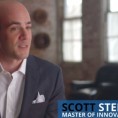If you’re planning a corporate meeting or special event for your company, your choice of professional keynote speaker to kick off the itinerary can be every bit as important as the venue, theme and timing for the occasion. While not every conference may call for the services of these individuals, who typically take the form of subject matter experts, thought leaders or bestselling authors, many promise to enhance team-building exercises, training programs and executive summits.
Typically, motivational speaking presenters are utilized by executives or meeting planners look to set a specific tone for a program, galvanize heightened interest in occasions, or inspire teams by sharing authoritative insight and/or outside perspective. So what should you know if you want to hire a keynote speaker? Let’s start by considering the basics.
Keynote speakers, who range in presentation style from informative to arresting and even outrageous, may also bring traditional performance skills to the stage, such as a flair for comedy, drama or eye-catching stunts. All aim to provide inspirational, motivational or attention-getting programs that challenge individuals and companies to raise the bar personally and professionally, overcome challenges, and see the world from fresh viewpoints.
While standardized presentations are available, professional speakers are most effective when they provide customized speeches tailored to your business, helping put attendees in the right frame of mind and providing viewers with immediately actionable advice. When looking for a keynote speaker, start by considering the role the speaker will play for your conference program, as many types of key note speakers are available, including:
• Motivational Speakers
• Inspirational Speakers
• Corporate Speakers
• Thought Leaders and Authors
• Educational Speakers
• Training and Development Pros
• Futurists and Trend Experts
Ask yourself: Which is appropriate for the audience and program in question? Next, think about the results you’d like to achieve, and why you want to hire a keynote speaker, with common reasons including to:
• Educate
• Motivate
• Inspire
• Drive Change and Growth
• Promote Awareness
• Fuel Personal or Professional Development
• Inform or Entertain
• Setting the tone for new programs, initiatives or business ventures, and providing a message that reinforces the cornerstone theme for the event.
• Engaging, exciting and motivating attendees, helping raise interest and awareness for issues, events, and topics of growing interest.
• Inspiring individuals, teams and entire organizations to heightened levels of performance or growth and development, and encouraging them to venture beyond perceived limitations.
• Providing training workshops and seminars that impart new skills, talents and insights to the organization, and provide for positive learning transfer.
• Offering expert insight into evolving global trends, business markets and issues that impact both individuals and corporate enterprises, and giving audiences an advance look at what tomorrow might bring.
Start by establishing a date, time, budget, location and venue for the meeting, and contemplating which professional speakers can service both the industry and area. Also take into account the type of presentation you’d like to offer audiences, and in what form (master class, after-dinner presentation, seminar, inspirational morning kick-off, workshop, etc.) the message is best delivered.
Note that speakers differ in their specialties as well: Motivational speakers often promote growth and positive action; inspirational speakers fuel change and encourage peak performance; and keynote speakers inform, excite and drive greatness on the personal, professional and organization levels. All play useful roles in ensuring a successful event.
- Other Points to Consider When Hiring a Keynote Speaker
• Clearly establish the purpose, topic and vision for the event up-front
• Consider audience makeup and demographics, and the type of speaker most likely to resonate with them
• Ask professional colleagues and connections for key note speaking references and recommendations
• Think about which types of speakers have been successful in the past with similar audiences
• Make sure you align keynote speakers and topics with key decision makers’ vision for the program














